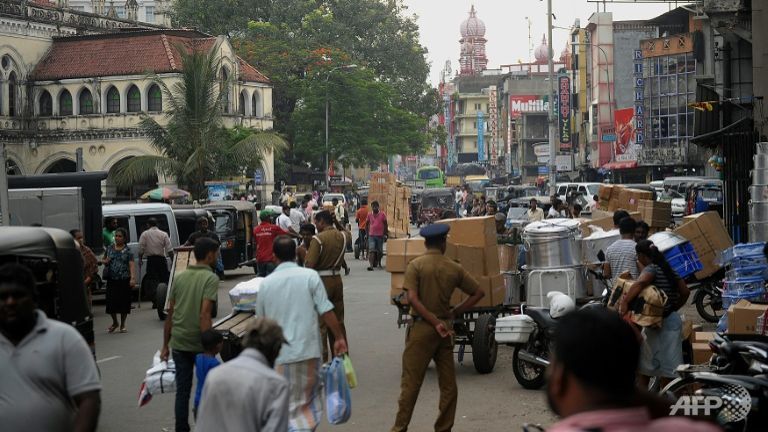IMF announces US$1.5b loan for Sri Lanka
 |
| Sri Lanka enjoyed a blistering economic growth rate averaging more than 8.0 per cent for two years after a prolonged civil war ended in 2009. (AFP/Ishara S.Kodikara) |
COLOMBO: The IMF has agreed a US$1.5 billion loan for Sri Lanka in support of economic reforms aimed at reversing a two-decade decline in tax revenue and reviving growth, it said Friday (Apr 29).
The International Monetary Fund's chief for Sri Lanka, Todd Schneider, said a staff-level agreement was reached to release US$1.5 billion over a three-year period in support of the island's reform agenda.
"This agreement will be subject to completion of prior actions and approval by the IMF?s Executive Board, which is expected to consider Sri Lanka?s request in early June," he said in a statement.
The island has already announced an increase in value added tax (VAT) from 11 to 15 per cent from Monday. It has also said it will scale down tax exemptions and promised to simplify revenue collection.
The IMF said the Sri Lankan government will seek to raise its tax-to-GDP ratio to 15 per cent by 2020 from the current level of 11 per cent.
Schneider said the IMF's Extended Fund Facility (EFF) to Sri Lanka was expected to "catalyse an additional US$650 million in other multilateral and bilateral loans, bringing total support to about US$2.2 billion".
An EFF is designed to help countries resolve serious balance of payment problems brought on by structural weaknesses in the economy.
Sri Lanka enjoyed a blistering economic growth rate averaging more than 8.0 per cent for two years after a prolonged civil war ended in 2009.
But the pace of expansion has since slowed, falling to 4.8 per cent in 2015, down from 4.9 in the previous year, according to official data.
The new government in Colombo sought an IMF bailout immediately after taking power in January last year, but the fund turned down the request, saying the country's reserves were at a comfortable level then.
However, the government faced a balance of payments crisis after the government went on a huge spending spree to implement its election pledges of higher public sector salaries and lower prices.
In 2009, Sri Lanka received US$2.6 billion from the IMF to boost its financial reserves, which dropped below US$1 billion at the height of fighting between Tamil Tiger rebels and troops.
What the stars mean:
★ Poor ★ ★ Promising ★★★ Good ★★★★ Very good ★★★★★ Exceptional
Latest News
More News
- France supports Vietnam’s growing role in international arena: French Ambassador (January 25, 2026 | 10:11)
- Foreign leaders extend congratulations to Party General Secretary To Lam (January 25, 2026 | 10:01)
- Russian President congratulates Vietnamese Party leader during phone talks (January 25, 2026 | 09:58)
- Worldwide congratulations underscore confidence in Vietnam’s 14th Party Congress (January 23, 2026 | 09:02)
- Political parties, organisations, int’l friends send congratulations to 14th National Party Congress (January 22, 2026 | 09:33)
- 14th National Party Congress: Japanese media highlight Vietnam’s growth targets (January 21, 2026 | 09:46)
- 14th National Party Congress: Driving force for Vietnam to continue renewal, innovation, breakthroughs (January 21, 2026 | 09:42)
- Vietnam remains spiritual support for progressive forces: Colombian party leader (January 21, 2026 | 08:00)
- Int'l media provides large coverage of 14th National Party Congress's first working day (January 20, 2026 | 09:09)
- Vietnamese firms win top honours at ASEAN Digital Awards (January 16, 2026 | 16:45)
















 Mobile Version
Mobile Version